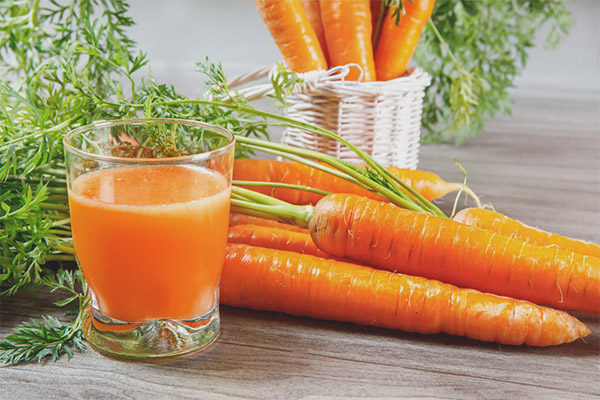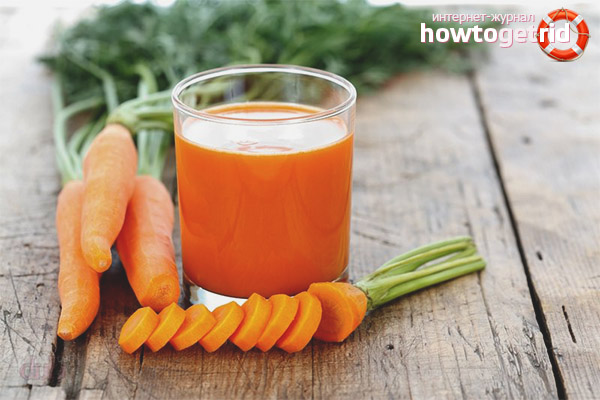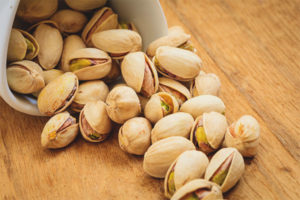The content of the article
Pregnant women need to fill the need for vitamins with the help of natural fresh juice. Among vegetable juices the first place persistently holds carrot. Carotene (vitamin A) in its composition is involved in the intrauterine development of the baby, strengthens the health of the mother. Also fresh carrot contains a number of vitamins and minerals that provide a normal metabolism during pregnancy.
Of course, carrot juice is highly concentrated and often causes allergies in the future mother. For its preparation, you need to choose the right vegetable so that the drink brings maximum benefit to the body.
Chemical composition
Natural carrot fresh, obtained by cold pressing of root crops, contains a huge amount of minerals and vitamins. Among them:
- “Beauty vitamins” A and E;
- vitamin C;
- vitamin K;
- vitamins of group B (pantothenic, folic, nicotinic acid, riboflavin, choline, thiamine, etc);
- minerals (iron, calcium, phosphorus, zinc, magnesium, iodine, manganese, potassium, cobalt, boron, copper, and others).
Carrot juice is a storehouse of beta-carotene, a substance that forms retinol in the body. The substance along with ascorbic acid strengthens the immune system and helps to resist colds, infectious, viral and bacterial diseases. Also, vitamin A provides the formation of the nervous and circulatory system of the child, is involved in the proper development of the heart, lungs and kidneys. Retinol is indispensable in maintaining visual acuity, which may slightly deteriorate during pregnancy and immediately after delivery.
Vitamin E or tocopherol is a natural antioxidant that interferes with oxidative processes, promotes cell rejuvenation. It fights pathogenic microflora and malignant processes. Also, vitamin E is involved in the synthesis of important hormones. Its action resembles progesterone, which allows you to save the pregnancy and reduce the risk of miscarriage, premature birth, intrauterine growth retardation.
Vitamin K is involved in hemostasis, ensuring normal blood clotting. This component is especially needed before childbirth, which will save the mother from bleeding and contribute to the rapid recovery of the body.
Vitamin B1 starts the metabolism and is responsible for the release of energy from carbohydrates. The more vitamin enters the woman's body, the faster the feeling of tiredness and drowsiness, irritability, and nervousness will pass. For a child, B1 is important because it contributes to the development of the brain and the central nervous system as a whole.
B5 is involved in all chemical reactions occurring in the cells. It also provides the synthesis of certain hormones, including progesterone.
Folic acid is known to all pregnant women, as it prevents the development of neural tube defects in the first trimester.
Potassium has a beneficial effect on the cardiovascular system of the mother and baby, calms the rhythm and pulse.
Calcium is involved in building the bone and muscle system of the child, prevents the fragility of the skeleton and osteoporosis in the future mother, strengthens the teeth.
Iron from carrot juice is perfectly absorbed by the body, promotes the production of red blood cells and hemoglobin, is responsible for cellular respiration.Regular use of fresh juice reduces the risk of iron deficiency anemia, which is accompanied by dizziness and fainting, pale skin, oxygen starvation, weakness.
Manganese affects the formation of connective tissue of the embryo. He is also actively involved in metabolism, provides nutrition to the fetus through the placenta.
The benefits of carrot juice during pregnancy
Due to its composition, the drink is ideal for dietary nutrition of future mothers. It allows you to get rid of signs of toxemia in the first trimester, heals the intestinal tract in the second and third, making the prevention of chronic constipation and hemorrhoids.
Also, carrot juice produces the following positive effects on the body:
- Reduces the acidity of the stomach, helping to eliminate heartburn.
- Normalizes digestion, stimulates intestinal motility, improves absorption of beneficial components. Also, the juice produces a mild laxative effect, making it successfully used for constipation.
- Cleans the body from toxins, metabolites, toxins, radionuclides, dead cells and excess fluid.
- Controls the metabolism of carbohydrates and the release of valuable energy.
- It strengthens the urogenital system, helps fight cystitis and incontinence in the later periods.
- Facilitates the work of the liver, cleans it of toxins.
- Eliminates mood swings in future mothers.
- Normalizes hormones, promotes the secretion of "pregnancy hormones."
- It clears blood vessels from cholesterol and atherosclerotic plaques, thereby restoring normal blood flow to the fetus.
- Improves appearance: the skin becomes ruddy and smooth, hair is strong and heavy, the nail plate is flexible and strong. Carrot juice improves the elasticity and resilience of the epidermis, which is important for preventing the appearance of stretch marks. It also improves muscle tone, reducing the risk of tears in the mother.
- Regular consumption of the drink reduces the risk of infection, sepsis and other complications after childbirth.
How to apply
The future mother should follow the rules of using carrot juice in order to preserve the maximum of useful components and properties.
- The drink is prepared at home by cold pressing (juicer, grating and squeezing, etc.).
- To prepare take fresh and very high-quality vegetables. The root must be smooth, bulky (palm sized or larger), initially unwashed. Before cooking, wash and sand the vegetable yourself, hold it for several hours in water to cleanse possible nitrates and helminth eggs.
- The resulting concentrate is not recommended to use in its pure form. It is desirable to dilute it with water or other fresh juice (apple, beet, etc.).
- Drink nectar immediately after preparation, until all enzymes and vitamins are stored unchanged.
- Carotene is absorbed exclusively at the same time with fats, which are not in carrot juice. Therefore, before use, add a teaspoon of vegetable oil, cream or fish oil capsule to the drink.
- If it is not possible to make fresh juice by yourself, then you can buy juice in the store. Avoid manufacturers that add flavor enhancers, preservatives and colorants to nectar.
Restrictions and harm
Carrot juice is a concentrated and extractive drink, so it is important to know what side effects and contraindications are possible.
First of all, the abuse of juice causes the following reactions:
- fermentation in the stomach (flatulence, bloating);
- nausea and vomiting;
- cramps and colic;
- severe diarrhea;
- the release of bile;
- acute food allergies;
- yellowing of the skin;
- headaches;
- weakness and lethargy;
- exacerbation of tooth sensitivity.
Doctors recommend that pregnant women use no more than 1 cup of juice per day, which is half diluted with water. For best absorption, drink a drink half an hour before meals.
To avoid the destruction of tooth enamel, fresh, you must slowly filter through a straw.
There are also contraindications to drink future moms:
- increased acidity of the stomach;
- gastrointestinal diseases (gastritis, colitis, flatulence, ulcers, and others);
- large body mass;
- diabetes mellitus (normal or gestational);
- allergic to orange or yellow vegetables, fruits;
- hypotension;
- urolithiasis and kidney stones.
Yes, there are a lot of side reactions and contraindications for carrot drink. However, with proper use, it is able to completely fill the body's need for carotene and to prevent diseases of the gastrointestinal tract.
Video: cold pressed juices during pregnancy












To send